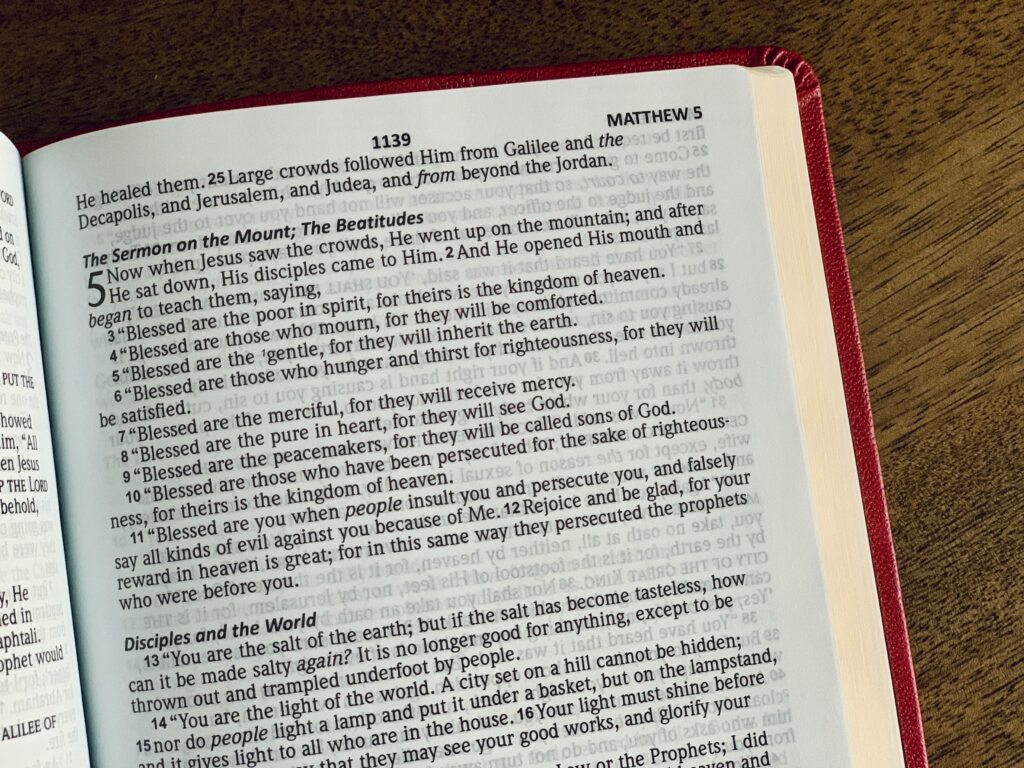Blessed are the Poor in Spirit
In the last post I gave a brief introduction to the Beatitudes as whole but in this one I want to begin to drill down into the specifics of the first one where Jesus says, ‘Blessed are the poor in spirit, for theirs is the kingdom of heaven’. However, As we do this we are immediatly confronted with a bit of a problem because the exact phrase, ‘poor in spirit’ is not found anywhere else in the Bible. Usually you can find other places where a particular word or phrase is used and then use those contexts to figure out what it might mean in our own, but we can’t do that so easily with the poor in spirit.
What we can do is find other places where the phrase, ‘in spirit’ is used to describe a persons inner disposition or sense of self. So, for example the Bible speaks of…
- Hardness of spirit as being mean (Deut. 3:20)
- Anguish of spirit as a kind of bitterness of soul (Job 7:11)
- An unyielding spirit as the capacity to persevere (1 Sam. 1:15)
- A crushed spirit as being like a broken heart (Psa. 34:8, cf. 51:17)
- Being grieved in spirit as a sense of rejection (Isa. 54:6)
- Proud in spirit as a type of arrogance (Eccl. 7:8)
So, in these instances a person’s spirit is used to describe their sense of disposition, their emotional state, their sense of self, their character, and so the question becomes ‘what might it mean then to be poor ‘in spirit’’? It seems, I would suggest, to push us toward a sense of inner emptiness or poverty of self, but what might this mean? A clue to answering this question might like with a group of people within Israel who are known as the ‘anawim’. The word ‘anawim’ is an adjective that can be used to describe those who are poor, those who are oppressed, those who are humble or have been humiliated, and who look to God for help. One person described the anawim as those…
‘Who could not trust in their own strength but had to rely in utter confidence upon God: the lowly, the poor, the sick, the downtrodden, the widows and orphans’.1
Another scholar said that the word anawim…
‘refers not merely to the materially poor and oppressed, but to those “who have taken that condition to their very heart’.2
So, from these lists and types of people you can begin to get a sense of what might lie behind Jesus’ use of ‘poor in spirit’, but can we get any closer? Well, there are a handful of verses that use terms that are a bit closer to what we are looking at and might help us somewhat. One such verse is Proverbs 29:23, which says, ‘A person’s pride will bring humiliation, but one who is lowly in spirit will obtain honour’. Here, ‘lowly in spirit’, which is pretty close to ‘poor in spirit’, is contrasted with pride and therefore pushes us to understand it as something like humility. But a really key text, that is perhaps the closest we get to ‘poor in spirit, is from Isaiah, where God says…
‘Heaven is my throne and the earth is my footstool; what is the house that you would build for me, and what is my resting place? All these things my hand has made, and so all these things are mine, says the Lord. But this is the one to whom I will look, to the humble and contrite in spirit, who trembles at my word’.3
The word for humble here, i.e. humble in spirit, comes from the same root word as anawim and so could be translated as ‘poor and contrite in spirit’, which would bring us very close to what Jesus says in this Beatitude. So, poor in spirit mightr relate quite closely to the humble, the contrite, and those who tremble at God’s word. Another way of trying to arrive at an answer is by exploring who, Scripture says, the anawim are not, not just who they are. So, it’s worth noting that throughout Scripture, the anawim, the poor, lowly, downtrodden, and oppressed, are contrast with a different set of characters – the oppressive rich, the wicked, the evildoers, the arrogant, the scoffers, the villains, and the proud. This dynamic could be summed up in the Proverb, ‘God opposes the proud, but gives grace to the humble’.4
‘because man had fallen through pride, [Wisdom] applied humility to his cure’ – St Augustine
And because God is a god who cares about justice, he is shown to be the great defender of the weak, powerless, and poor, the one who will fight for them against these tyrants (Ex 22:25–27; Pss 12:5; 35:10; 40:17; Is 3:14–15). Now, in Matthew’s Gospel, this looks like God leveraging his power and authority for the sake of the poor in spirit by giving them the blessings of his kingdom.

For theirs is the kingdom of Heaven
Blessed are the poor in spirit for theirs is the kingdom of heaven! The kingdom, the very rule and reign of God, Jesus says, belongs to this type of people. It’s worth remembering that during the time of Jesus there were a number of different groups who were all trying to get the kingdom of God by different means, whether that be through personal holiness and keeping commandments or through violent resistance, but Jesus comes into the mix and says, the kingdom belongs to the poor in spirit, to the humble, the childlike, the lowly, the oppressed, the humble, and the downtrodden.
This is scandalous! Jesus the great disruptor and disturber of the status quo does it once again. Later in the Gospel he will infuriate the religious leaders by declaring that the treasonous tax collectors and sex workers are entering the kingdom ahead of them because they were willing to receive his call to repent and reorientate their lives around his truth, whilst they were not (Matt. 21:28-32). The so-called notorious sinners were willing to come to Jesus, to humble themselves, ask for mercy, and seek to live in a different way. The kingdom, Jesus says, belongs to them because they humbly recognise their need for help and for grace.
‘People come to our communities because they want to serve the poor; they will only stay once they have discovered that they themselves are the poor’ – L’Arche Communty Member

What about us?
As I was thinking about this I was reminded of the times that I have had the privilege of attending a number of AA meetings over the years and other recovery programmes. During these meeting I have always been struck by the power of having spaces where were are able to own, admit, and share our struggles. There is a beautiful kind of poverty of spirit present in these spaces where people are honest about what is going on and how they are doing that week. And there is a reason that many first steps in recovery begin with a sense of owning your powerlessness and learning to surrender and ask for help from a higher power.
Some of us might have had struggles with substance misuse and be very familiar with recovery programmes. In fact, you may have been through some of these stages and therefore you could well be further down the road toward healing and a healthy poverty of spirit than many of us who haven’t. For others, our struggles may be more hidden, or perhaps even more socially acceptable, but equally spiritually harmful. We might battle secret lusts, envy, selfish ambition, or pride and be terrified of anyone ever knowing. We might pretend that we are following Jesus but we have never truly surrendered every part of our lives to him. Wherever we find ourselves, we are reminded that the cross is the great leveller, that we have all, every single last one of us, fallen short of the glory of God.
But remember, the gospel means good news! If you are struggling I have good news for you. If you are overwhelmed with shame I have good news for you. If you think that God could never love or accept you, I have good news for you. If you think you cannot ever be free of your chains then I have good news for you. The gospel tells us that God does love us, despite all our brokenness and sin. The gospel tells us that there is mercy, grace, and forgiveness for all who ask for it. The gospel tells us that our shame is removed and we are accepted as God’s sons and daughters. The gospel tells us that Christ came to set us free and that wherever the Spirit of the Lord is there is freedom.
But here is the kicker…. God can only work with that which we bring into the light and healing can only begin when we are poor in enough in spirit to acknowledge our need to him. So, let me invite you to take some time and just reflect on what invitation this beatitude might hold for you.
- Brown, Raymond E., The Birth of the Messiah: A Commentary on the Infancy Narratives in the Gospels of Matthew and Luke, New Updated Edition. (New York; London: Yale University Press, 1993), pp. 350–51 ↩︎
- Keener, Craig S., The Gospel of Matthew: A Socio-Rhetorical Commentary (Grand Rapids, MI; Cambridge, U.K.: Wm. B. Eerdmans Publishing Co., 2009), 168-169 ↩︎
- Isaiah 66:1-2 ↩︎
- See James 4:6 and Proverbs 3:34 LXX. ↩︎

